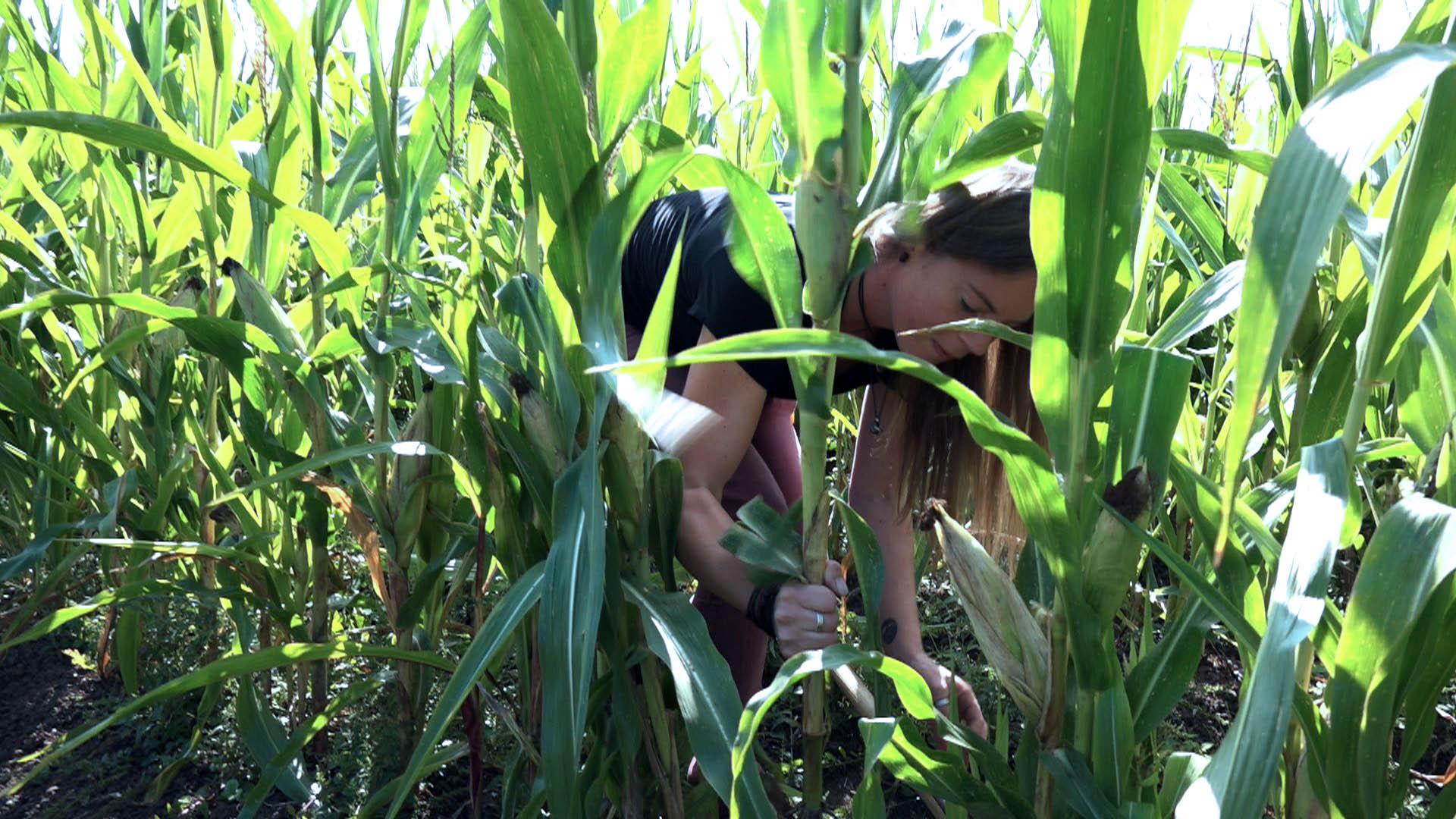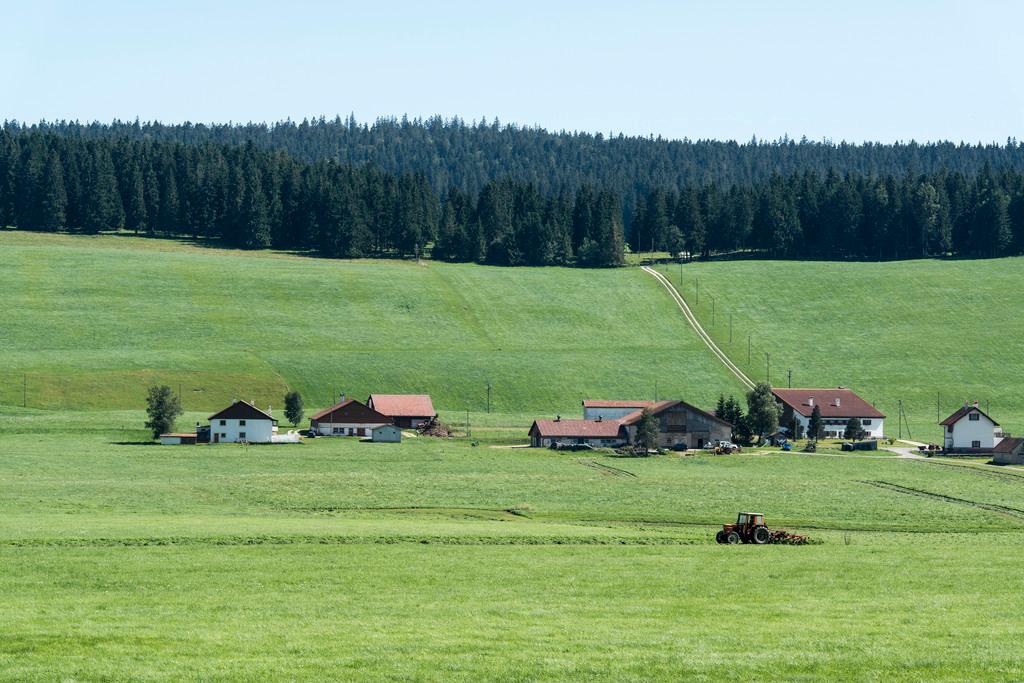How green is the global organic food market?

Organic tomatoes grown in Morocco in Switzerland; Swiss organic grains for breakfast in China. The path travelled by organic farming products is getting longer. But is this putting the environment under threat?
“Do we really have to eat tomatoes all year? The large distributors are spoiling Swiss consumers.” While organic farmer Martin Köchli welcomes the increased selection of organic farming products found on the shelves of Swiss supermarkets Migros and Coop, he doesn’t believe that the same products have to be offered all year round.
Köchli is president of Bioforum SchweizExternal link (Switzerland), which is committed to a “diverse, ecological, and social agriculture.”
In his view, organic farming is about much more than doing without artificial fertilisers or poisonous sprays. It also includes diligence and frugality, two virtues that are not highly valued in today’s consumer society.
Köchli worked on an agriculture development project in the 1980s in a remote region of what is now the Democratic Republic of Congo and knows something about managing hardship.
Soy example
“There were poor, sandy soils with low yields,” he recalls. “We introduced the production of soybeans, which was much more efficient than starting up a large animal breeding programme. Soy can efficiently cover protein requirements.”
“If it’s fed to chicken or pigs, the efficiency drops significantly,” he said, alluding to meat production methods in Switzerland.
“We shouldn’t import vast amounts of soy and maize from Brazil to feed to fattening animals here. The large amounts of land used to grow such food mean that the Brazilian population is missing out on a decent diet.”
Even organic-grade soybeans can be imported from abroad; some of them even with the “Bud” label, given to products by Bio SuisseExternal link, the federation of Swiss organic farmers. But is soy that has travelled 10,000 kilometres still consistent with the organic principle of sustainability?
Daniel Bärtschi, head of Bio Suisse, justifies these imports by pointing out that too little soy is grown in Switzerland and Europe. As with all Bud-certified products, air transport is not taken into account, which significantly improves the ecological balance. “For a farmer in India, it’s a market opportunity when he can sell his organic products in Switzerland,” said Bärtschi.
All year round
Soybeans from India, coconut water from Sri Lanka, grains from Ukraine or Canada, yoghurt with fruit from Romania, Poland or Serbia…the list of organic products purchased beyond borders keeps getting longer.

More
What research can do for organic farming
Bio Suisse alone has approved the import of certified products from 60 countries and around 2,000 facilities. “This is only when demand cannot be covered by the domestic market,” explained Bärtschi. For products with the Bud label, the share of imports for fruit and grains is 66%. “In the end, imports are about covering the needs of consumers,” he added.
But what are the needs exactly? Are consumers of organic products so spoiled that they request the entire range of products all the time? Rising exports of organic food indicate an increasing globalisation of the market.
Swiss producers benefit. For example, bio-familiaExternal link, which describes its idyllic location in Switzerland on its website as: “On the banks of [Lake Sarner], surrounded by high mountains and fresh air”.
The company, rich in tradition, has 180 employees and has expanded globally, selling its products in nearly 40 countries. Europe, Canada, the Middle East and Asia account for the company’s most important sales markets. “bio-familia is one of the few companies that have received China’s organic certificate. We export baby products to China,” said Bettina Künzli, the deputy marketing manager.
As the United States and Switzerland agreed in July on the mutual recognition of their standards for organic products, the US will likely become an important export market for organic muesli in the future, added the marketing expert.
“Only by being careful with our resources can we sustainably produce healthy products into the future,” bio-familia promises on its website. And what about the resources that are consumed during the transport of the organic muesli along the sea route to China, covering some 13,000 kilometres?
“A legitimate question,” concedes Künzli. “It’s a matter of fact in a globalised world. We couldn’t live on the domestic market alone.” The company’s total exports account for 45% of revenue, and 20% already in the organic market, according to Künzli.
“Relationships, responsibilities.”
Bioforum’s Köchli has “great respect for the achievements of this family-run business, which is located in an isolated area”.
“But if I were bio-familia, I would court a clientele from the surrounding region, which could secure the company’s existence,” said the canton Aargau-based organic farmer, making a comparison with his own operation. “For more than 25 years, my wife has travelled to the market in Bremgarten – seven kilometres away – with our products. A relationship with the clientele has developed.”
Köchli wishes that diligence and frugality would once more become virtues in society and the economic world and that the corresponding price for the work put in would be paid.
“Open-mindedness and solidarity should manifest itself in this appreciation rather than in the amount of displaced goods worldwide,” he said.
Swiss organic market
Sales of organic products rose 7.5% to CHF2.2 billion ($2.3 billion) in 2014. Organic products therefore have a 7.1% market share.
Bio Suisse has no numbers concerning imports and exports of products from organic farms, but it does gather information on imported amounts of certified products. Imports account for two thirds of the total for fruit, including tropical fruit, and cereals. The association allows imports from 60 countries, with 2,000 businesses delivering Bud label products from abroad.
In Switzerland, the number of organic farming operations has increased slightly since 2010 – rising 2% each year. In 2004 – a record year – there were 6,320. Most follow Bio Suisse guidelines – in 2014, the number totalled nearly 6,000.
The proportion of organic farming operations increased to over 12% because the total number of agricultural operations is on the decline in Switzerland. Organically cultivated areas cover 130,000 hectares, corresponding to 12.3% of total useable agricultural land.
(Source: Bio Suisse)
Translated from German by Catherine McLean

In compliance with the JTI standards
More: SWI swissinfo.ch certified by the Journalism Trust Initiative













You can find an overview of ongoing debates with our journalists here . Please join us!
If you want to start a conversation about a topic raised in this article or want to report factual errors, email us at english@swissinfo.ch.